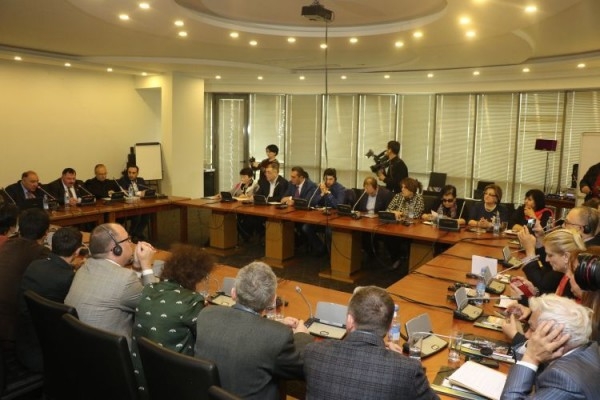On Tuesday in Tbilisi the international conference "Peaceful settlement of the Nagorno-Karabakh conflict and a new mission of civil society" took place, at which representatives of the civil society of Armenia and Azerbaijan in the framework of the "Civil Peace Platform between Armenia and Azerbaijan" told about further plans of action, the main purpose of which is the help to The OSCE Minsk Group with working more efficiently. This is reported by Eurasia Diary.
Over one hundred representatives of civil society, international organizations, religious figures, politicians, diplomats, scientists and media from 14 countries of the world were invited to the conference.
Guram Markhulia, the Chairman of the Caucasus International Center of Geopolitical and Geo-historical Studies (Georgia) opened the conference.
He said that this dialogue between the civil societies of the two belligerent countries will continue at the highest governmental level.
Kamil Salimov, a professor at the Baku State University, Doctor of the Science of Law, stressed that this year it was exactly 30 years since the beginning of the Armenian-Azerbaijani conflict and no steps have been taken to resolve it.
"Since the end of the 1980s, active fighting has begun; an open armed confrontation is currently taking place on the contact line. Since 1994, the UN has created the OSCE Minsk Group specifically for the settlement of the Nagorno-Karabakh conflict. What did it achieve? The method of cessation of hostilities was used, but it was not fully effective. In 2008, in 2014, and relatively recently in April 2016, there were major military clashes. Why are we afraid of fighting? Because there are no guarantees that it will not immediately develop into large-scale military operations at the front.
One of the really effective steps towards a peaceful resolution of the conflict is the inclusion of the "Civil Peace Platform between Armenia and Azerbaijan" in the negotiation process as public observers in the OSCE Minsk Group.
This is the first time when an actually formed group of representatives of the conflicting sides is acting on an organizational basis.
Three countries that are permanent representatives of the Minsk Group - France, the United States and Russia - must resolve the conflict. But the relationship between the members of the MG, in particular between Russia and the US, themselves need to be improved," said the professor.
In the end, he summarized that without civil society, no peaceful result will be stable and durable.
Arthur Agajanov, a historian-researcher, civil activist (Armenian), said that many are skeptical about the civil initiatives of the Platform.
"On the other hand, Minsk meetings demonstrated almost 30-year inefficient work. A new generation of Armenian and Azerbaijani refugees has already grown up. "
In the end, he, an Armenian historian, added that they are not the only one who has this conflict, but it is also in the fraternal Georgia, Ukraine, and Moldova.
Umud Mirzayev, president of the International Eurasia Press Fund, said that he is a victim of the Nagorno-Karabakh conflict. He called on the international community to help resolve it.
Yesterday, the appeals from the “Civil Peace Platform between Armenia and Azerbaijan” have been received by the presidents of Armenia and Azerbaijan, co-chairs of the OSCE Minsk Group, Pope Francis, the Catholicos of All Armenians Karekin II and the Chairman of the Supreme Religious Leader of the Caucasus Muslim Board Sheikh-ul-Islam Haji Allahshukur Pashazade. I want to believe that they will support the initiatives of the Platform aimed at a peaceful settlement of the Nagorno-Karabakh conflict between Armenia and Azerbaijan. It's time to end the 30 years of conflict and achieve sustainable peace. "
At the conference there were also featured the discussion panels on topics of "The role of civil society institutions and the media in the peace process", "The Nagorno-Karabakh conflict through the eyes of Armenian and Azerbaijani women" and "The contribution of international organizations and religious leaders to the peace process".


